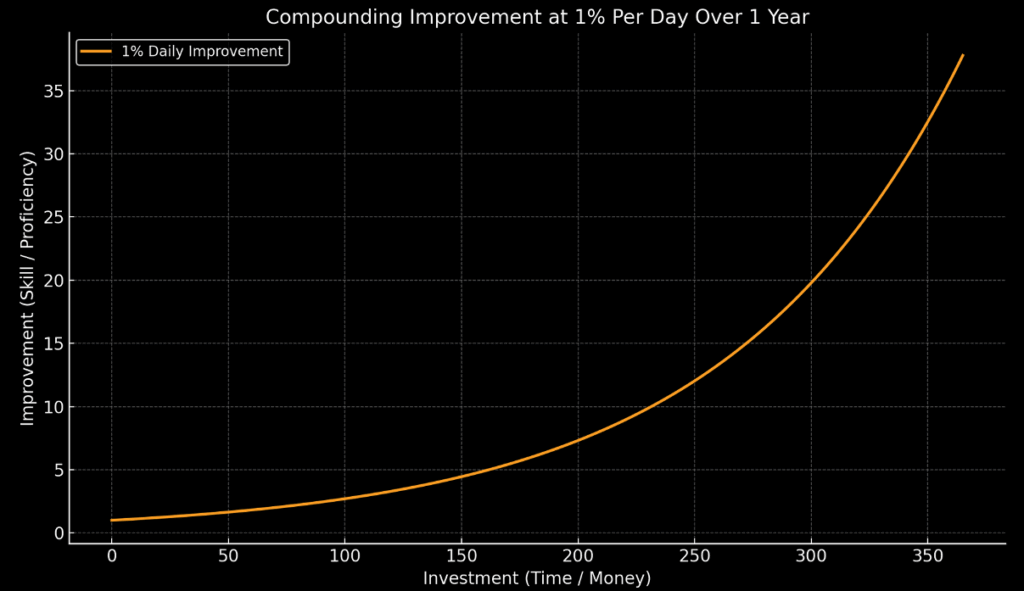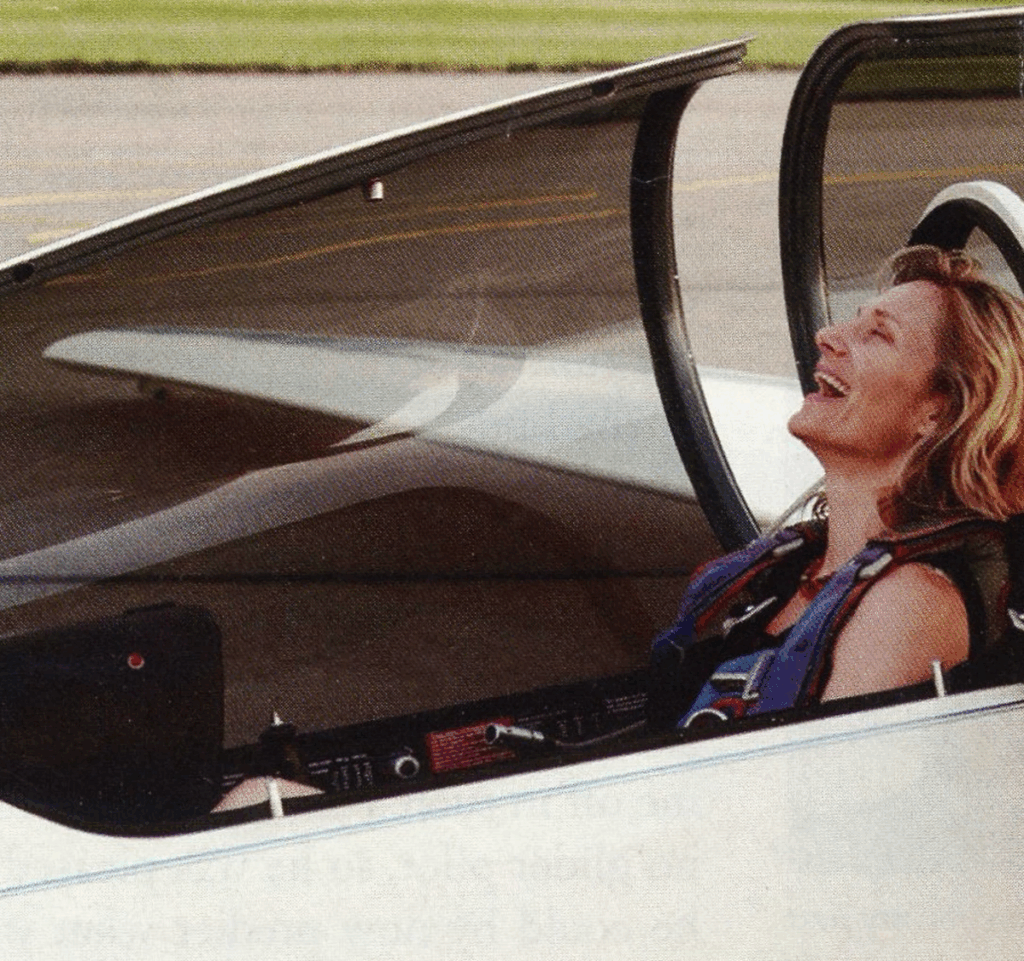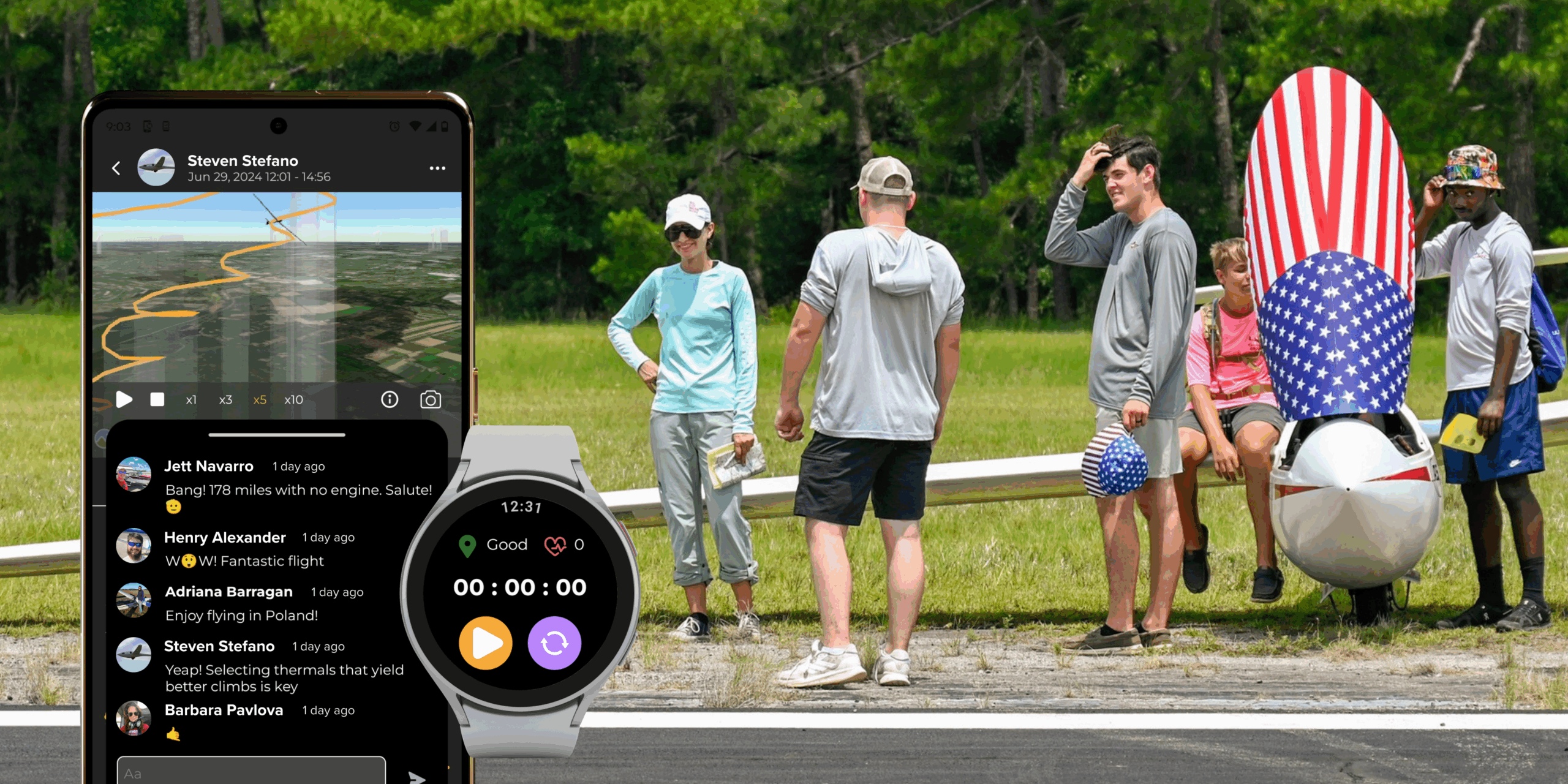“You deserve to own your path to become a damn good pilot and enjoy yourself in the process.”
Here, you’ll find specific and proven ways to move toward the pilot you want to become with confidence, while making the most of your investment. Applying each of these 5 tips will help you progress fast and increase the fun along the way.
The Power of Compounding
The cost of a minute in flight training is between $3 – $5 USD. Doesn’t sound too bad ha?
Minutes seem to do little difference, but their impact over time is enormous. To understand the impact of your minutes, it is useful to understand the power of compounding:

If you improve by just 1% each day, by the end of the year you’ll be about 37 times better.

“Stop putting pressure on yourself to achieve your goals and instead use the power law of compounding improvement.”
The following Tips will explain you how to train smarter and see faster growth.
1. Capture Learning
Set aside time after every flight to discuss, review, and learn from what happened, what worked, what did you learn that can be applied to future flights, what didn’t work, what did you fail to prepare for?…
Reflecting on our flights is a powerful process. More valuable than the flight itself because here is where you extract what you can take away from the flight. Every hour spent in this reflection process pays off in many hours saved down the road while gaining confidence because you know exactly what to do next.
You don’t need to spend an hour after each flight, you can simplify this powerful process down to 3 key questions, just 3:
What takeaways can you gain from what went well?
What takeaways can you gain from what did not go well?
What changes can you make to how you do things?
A proper post-flight reflection doesn’t end by noting what did you do, what went well, or what needs improvement. The critical thing is understanding and identifying the changes you can make:
| Notes | Takeaways |
| “Hey, better landings” | Can you integrate “better landings” into your current knowledge? It sure tells me what went well, but can you use this to replicate the mechanics you used for such landings? |
| “Better landings. You dissipated all flying speed while flying a few inches over the runway.” | Ok, you can try to replicate that: Dissipate all flying speed while flying a few inches over the runway. |
| “You were behind the airplane.” | Can you prevent mistakes by remembering “You were behind the airplane?” |
| “You were behind the airplane because you allowed your final approach speed to decrease before entering ground effect, giving you very little time to react before landing.” | Seems like you can prevent being behind the airplane by holding speed. So hold final approach speed next time. |
These 3 questions are very powerful because if you just review what went well, what didn’t go well and what you did, you will have a long list without workable directions. For example, if your landings are not going well, telling yourself to just “practice more landings” won’t help you improve. You need to be SPECIFIC.
Now, let’s say you’ve got great insights. Keep a record! Otherwise, you will be wasting a lot of money worth of knowledge. Memory fades quickly. You don’t have to write things down after the flight if you are tired. Go take a shower. You can do this remotely with the FlyORKA app. The point is to make sure you capture the lessons you learned and the changes you can make to improve. Your future self will thank you as you create your personal collection of flights, insights, and breakthroughs, not just a record of hours.

“I will make it a habit to take note of what I learn and the changes I can make to improve.”
2. Feed Learnings into Prep
Do you want to learn the same lesson twice? 3 times? 4 times? Flight training is expensive, and many students waste their investment by repeating lessons. Integrate what you’ve learned directly into prepping for your next flight, preferably reviewing your notes the night before your flight.
When you fly, do your best, don’t think about your failures or shortcomings. Learn to talk to yourself in useful ways to direct your actions.
“To want to fly with skill, is always enough. To do your best, is always enough.”
You can think of this as a repeating loop. You feed the learnings from your past reflections into preparing for your next flight. When you fly, you do your best. You take the time to reflect on your flight looking for learning and improvement, and then go back to the top of the loop. Repeating again, and again, and again, as a habit.

“If you repeat this loop again, and again, and again, progress compounds with the power law…”
3. Learn from your Buddies
Learn from your buddies! “We” = pilots, “We” want to discuss, “We” want to learn, and “We” want to understand. Exchange thoughts, analyze situations together, see that you are not the only one doing your best or struggling with something, and take other people’s notes if you think they may solve one of your current issues.
We like having pilots at our level, pilots slightly ahead, and pilots to look up to. Joining pilots you admire gives you a platform to grow and accelerate your progress, while flying buddies push you forward and keep you accountable. It’s a growth multiplier we call PeerLift.
True communities are built on what we’re excited learning more about. Ultimately, this tip is about finding your tribe or building your own squad, which will give you access to expand your awareness through their experience and gain the confidence to step into your next goal. From power pilots, soaring pilots, sport pilots, aerobatic pilots, backcountry pilots, pilots in training…to instructors, we built the FlyORKA’s Community Flying Board with the vision to give you an active digital airport where you can find interesting pilots. You can further review Pilot and Instructor Profiles to learn more about their skills, experience, and journey.

“You are not the only one doing your best or struggling.”
4. Find a Trusted Partner for every stage of Training
Flight schools don’t train you—instructors do. Whether you pick a flight school with 1 instructor or 100, what is important is that you work with the right instructor. Learning from the right person matters. At its best, having to switch schools or instructors can create conflicting information and expectations that will slow you down. At its worst, having to switch schools or instructors forces you to repeat lessons, or even start all over again. It is a highly unstable situation that takes away time, energy, and money.
Finding the right instructor comes down to 1 thing: the thoughtfulness they give to their students. You can identify the instructor(s) you can count on by answering 2 questions:
How is this instructor preparing students?
Is this instructor able to help me ‘get it’?
Both are equally important. Similar to finding your flying buddies, the FlyORKA app allows you to explore instructor profiles, giving you their track record of coaching. You can see their syllabus, lesson plans, calendar, the quality of the notes they share with students, and easily contact their students to find out more about them. You are looking for specific, methodical, and consistent coaching.
Once you find a few options, consider how the instructor makes you feel, their commitment to working with you from start to finish, the experience they can share, and anything important to you.

“Thoughtfulness is key. You don’t want your instructor treating you as an afterthought.”
5. Seize the Day
This is all about being ready to engage with what you are about to do. Your reaction time, ability to command and control what you do, and the timing of your actions are all controlled by your mind. If you want to perform better, you want to feel better.
Sleep, fatigue, stress, lack of movement, lack of rest, and nourishment—all impact our mental performance. While we all have different bodies, what’s important is that you learn yours to make the most of it.
At FlyORKA, we are currently working on helping you understand how your mind improves in handling in-flight activities as you integrate skills.
“Flying is a mental game. Feeling good is the first step to doing good.“

Applying the 5 Tips
By adopting these 5 Tips, you’ll unlock exponential progress while expanding your horizon, avoiding waste and setbacks along your journey. The FlyORKA app makes it very easy to put these 5 Tips into action, again and again, so your growth never stops.




